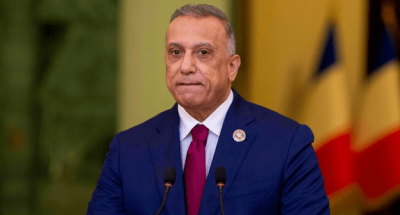By chance, I met Iraqi Prime Minister Mustafa al-Kadhimi during the most difficult 48 hours Iraq had faced. The land of the Ribath was divided between two factions, each with its own narrative claiming righteousness while labeling the other as wrong. Baghdad was hanging by a thread, ready to be turned upside down if any sparks flew. The combatants were preparing for their holy war, with their dead in heaven and theirs in hell, oblivious to the fact that they were all victims of politicized violence, systematic incitement, and programmed corruption. Some made light of confrontation and cheapened blood, as if they had not learned from their predecessors in such types of wars within the same social fabric, community, household, or family, that it is not necessarily the instigator who can end it, and that even the victor is merely the strongest of the losers. The confrontation cannot be confined to a specific location, faction, sect, or ethnic group. One of its dangers is that it spreads its contagion to all nearby and distant homes.
That evening, al-Kadhimi was calm and composed, flipping through the pages of possibility and jotting down in his notes the phrase where he began his discourse: “Blood must be spared.” He was not willing to accept the spilling of even a single drop of blood. He stated without hesitation, "Violence is not my profession; if I were given a choice between blood or departure, I would choose to leave." In that moment, al-Kadhimi recalled his civilian identity, recognizing the gap between himself and the Iraqi forces and parties, especially the Shiite ones, that oppose him because of his civilian nature. It was as if he bore the responsibility for their losing their primary position, meaning the departure of the premiership from the hands of the leaders of the Shiite political house due to what they viewed as a conspiracy that al-Kadhimi and his team orchestrated. They have been plotting since they were forced to appoint him to entrap him with accusations of standards. However, they discovered too late that the hour hand would not revert to the time before the October 1, 2019 uprising and that April 9, 2020—the day of his appointment—set standards that were no longer available to most of their faces. Hence, some members of this house suffered from a syndrome of deliberate denial, stubbornly refusing to recognize that he came to his current position due to their abysmal failure in managing the state and its wealth. Al-Kadhimi may have realized their crisis early on and prepared himself to inherit them, which is his right as it is any other Iraqi who sees himself as a deserving alternative. The elite in Iraq are not limited to its parties and political movements, and al-Kadhimi is not an exception but rather a station built by the October uprising on the path to change since the beginning of the battle to topple the regime leading to the generational displacement project. Thus, what was fixed has become fluid, and the fluid has diversified religiously, culturally, and politically.
In that meeting, al-Kadhimi resembled someone caught between the jaws of a vice—one side having entered the Green Zone and the other preparing to protest behind its walls while hinting at the possibility of scaling them. Amidst these tensions, al-Kadhimi, who was targeted by both sides, stood like someone holding onto the embers of stability, fully aware there weren't enough tools within the state to enforce it. Hence, he issued the word "dialogue," which opened a window to defuse the escalation.
Effectively, al-Kadhimi appeared more reconciled with himself and appreciative of his strength. He resorted to the easy yet necessary act of dialogue, urging everyone in a moment of tension to use their intellect rather than their muscles, invoking the wisdom of fear in hopes it would calm the heated minds. This invitation requires the supporting parties to be ready to make courageous concessions and accept significant compromises, taking into consideration a broader national space that has formed after the October uprising, which cannot be denied or confiscated. Any neglect or disregard for it will compel it to reassert itself in different forms that will be difficult to contain this time.
Therefore, al-Kadhimi is neither an exception nor a constant; he is a temporary or long-term variable. However, no party can condition his removal or even impose his continuity. He has his rights and his responsibilities, and the mission he came for has not ended since it was mandated by the October uprising, culminating in the current crisis (postponing the confrontation between the combatants)—this time through dialogue.




